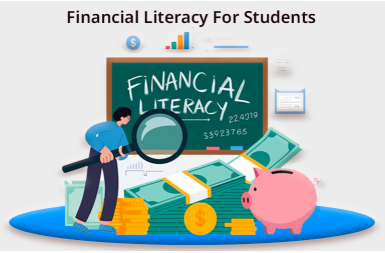In today’s fast-paced world, knowing how to manage money is just as important as getting good grades. While academic success opens doors, financial literacy equips students with the skills to keep those doors open throughout life. Understanding how to budget, save, and make smart money decisions can lead to greater independence, reduced stress, and long-term stability.
Why Financial Literacy Matters in 2025
Many students graduate without the basic knowledge needed to handle everyday financial responsibilities. From managing student loans to understanding credit scores and planning for future expenses, financial literacy builds a foundation for smarter decisions in both college and career life. As the economy evolves, students who are financially informed are more likely to avoid debt traps and take advantage of opportunities like scholarships, internships, or part-time work.
Budgeting Basics for Students
Learning how to create and stick to a budget helps students stay in control of their money. Whether using a simple notebook or a budgeting app, tracking income and expenses allows students to make informed choices—like how much to spend on food, transportation, or entertainment. Even a small, consistent savings habit can lead to a strong safety net in the future.
Understanding Credit and Debt
Credit cards can be useful tools if managed wisely. Students who learn about interest rates, minimum payments, and credit scores can start building healthy financial habits early. It’s important to understand that borrowing money comes with responsibility. Making payments on time, avoiding high-interest debt, and knowing the difference between good debt (like student loans) and bad debt (like unnecessary purchases) is key.
Saving for the Future
It’s never too early to save. Even small contributions to a savings account can grow over time. Whether saving for books, emergencies, or future goals, students who prioritize saving are more prepared to handle unexpected expenses without relying on credit. Many students also begin exploring investing through educational platforms that help explain simple concepts in easy-to-understand ways.
Financial Tools and Resources for Students
Technology makes it easier than ever to learn and practice financial skills. There are plenty of free resources—podcasts, YouTube channels, financial literacy apps, and online courses—that offer practical advice tailored for students. Many universities now include financial wellness programs, giving students tools to plan ahead with confidence.
Conclusion: Life Lessons Beyond the Classroom
Financial literacy gives students an edge that textbooks can’t always provide. By learning how to handle money wisely, students build a skill set that promotes independence, reduces financial anxiety, and sets the stage for a secure future. Success isn’t just about the grades you earn—it’s also about the habits you build. And with smart financial choices, students can thrive both in and out of the classroom.














